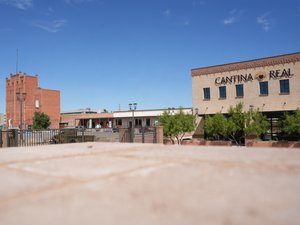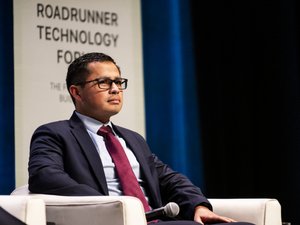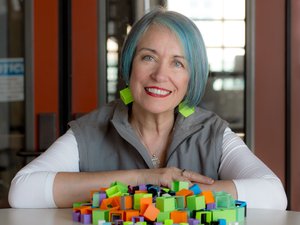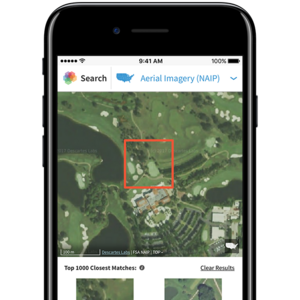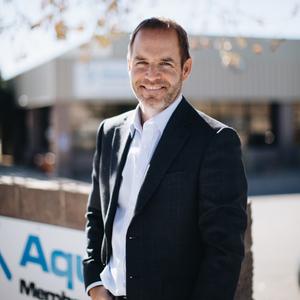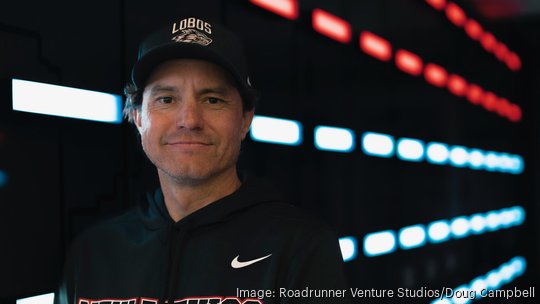
Roughly a year and half ago, Doug Campbell came home.
That is, the seasoned entrepreneur, who helped take one company public and sold another to a major player in the U.S. space industry, departed Colorado's Front Range area, where he'd found his startup success, and moved to Albuquerque, his hometown.
Campbell, who studied engineering in both undergrad and graduate school at the University of New Mexico, left the state in 2002, after completing his master of science in civil engineering.
About a decade later, Campbell co-founded Solid Power Inc., a solid-state battery technology company, as a spin-out from a science project at the University of Colorado Boulder, he explained in a 2023 LinkedIn post.
Based in Louisville, Colorado, Solid Power (NASDAQ: SLDP) went public in December 2021 via a special purpose acquisition company, or SPAC, reverse merger, sister publication Denver Business Journal reported at the time.
Just over a year prior, Campbell helped guide another company he co-founded through a different type of transaction. He oversaw the sale of Roccor Inc., a satellite component company, to Redwire Corp. (NYSE: RDW), a Florida-based aerospace firm, in late 2020.
He told the Denver Business Journal a few months after the sale closed that selling Roccor, which he co-founded with Will Francis, would help the satellite industry-focused firm continue to grow.
In late 2022, Campbell left Solid Power, nearly a year after taking the battery company public.
Shortly after departing Solid Power, Campbell was on the road back to New Mexico; he currently splits his time between Albuquerque and Gunnison, Colorado.
Altogether, Campbell said he's raised close to a billion dollars for his companies through a combination of federal dollars, venture capital and public markets.
Money's not necessarily lacking in New Mexico, Campbell said. He cited the State Investment Council as one source of "fairly significant investments" into the state; the Council has dished out upwards of $500 million in state dollars to venture firms out of its New Mexico private equity program over the past two years.
It's a relative lack of investment-ready companies in the state, Campbell said, that makes New Mexico's startup and technology system a bit more fledgling as compared to established markets in California's Bay Area, the Boston metro or Colorado's Front Range, where Campbell grew his own companies.
Now, Campbell wants to help change that, in part, by starting work with Albuquerque's Roadrunner Venture Studios as a senior advisor. The venture studio, which formally launched late last year as the first investment by national tech-focused venture firm America's Frontier Fund, wants to find promising technologies out of research and development institutions in New Mexico and turn them into prosperous companies.
It's named three such portfolio companies to date. Campbell's objective with the venture studio, he said, is to help find more, by working directly with institutions like the University of New Mexico, his alma mater, Sandia National Laboratories and others in the state.
"Although Roadrunner is not 100% New Mexico-centric, per se, I largely am," Campbell said. "I'm based here, and my interest is in growing the startup ecosystem here."
The new Roadrunner advisor also recently launched a podcast, called "Leaders of Enchantment," that Campbell said he hopes can encourage New Mexicans to "strive for excellence."
New Mexico Inno recently sat down with Campbell to hear more about his plans with Roadrunner Venture Studios and his thoughts on New Mexico's startup and tech ecosystem.
This interview was edited for brevity and clarity.
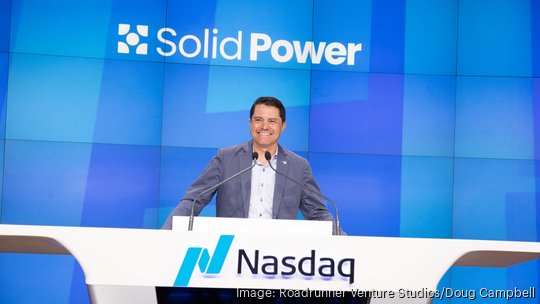
New Mexico Inno: Since moving back, what have you seen in New Mexico's startup ecosystem? Do you think that there's potential?
Doug Campbell: There is an existing ecosystem here. As you would expect, it is, I think, pretty small. I'd call it 'sub-critical,' meaning it's still very early stage and has, in my opinion, a much higher ceiling.
With that higher ceiling, are there specific areas you think could help reach that ceiling?
Everything involves a niche. Every ecosystem has their particular focus — except Silicon Valley, which does everything. To me, the obvious ones here are very hardware-oriented, hard tech. Not to exclude software, but just that that is obviously a strength of this community. Certainly defense and space and cyber, I think, are kind of no-brainers for this community.
So, why hasn't New Mexico achieved that higher ceiling you think the state could achieve?
I think it's the sub-critical entrepreneurial ecosystem. We don't have a lot of seasoned tech startup entrepreneurs.
When I say tech startup, a couple of boxes there: One, an understanding of technology. I'm an engineer by training. You don't have to be an engineer by training but you at least have to be conversant in technology. Another box to check is — no kidding — you've raised quite a bit of resources for startups in the past. You have a proven track record. You just simply don't have a lot of that here in New Mexico; there are just not a lot of good examples walking around.
Taking a step back, why is that important?
If you don't have seasoned entrepreneurs, you don't have an ecosystem. All the great [research and development] in this state, it's akin to a printer and pages are just dropping onto the floor.
With Roadrunner specifically, what potential do you see here? Why are you interested in working with them to kind of help increase that criticality?
It's primarily because of the venture studio model. I'll start first with traditional venture capital investing. Generally, how it works is: I'm an investor, you're an entrepreneur, you pitch your business to me, I like it, we negotiate on terms, and I'm going to give you some money in exchange for equity in your company. Perhaps, at most, I'll take a board seat. I'll participate in your corporate governance. But I'm not rolling up my sleeves and getting dirty with you. That's not generally how the venture world works.
[Roadrunner] is different. This is oftentimes you're getting involved before there's even been an entity formed. You're at more of a conceptual stage, and it's about company building.
What I've concluded here in Albuquerque is that there's not enough deal flow — [the] number of investment opportunities that follow the traditional model. It's just because of the relative lack of maturity of our ecosystem, and so we don't really have the luxury of doing just that to the exclusion of anything else.
Whereas in a venture studio model, you get involved early, early on. It's minimum viable product development, team development, go-to-market strategy development, customer development, etcetera. You're getting involved very early on and you're having a seat at the table. Which is what I did. I cut my teeth doing that.
